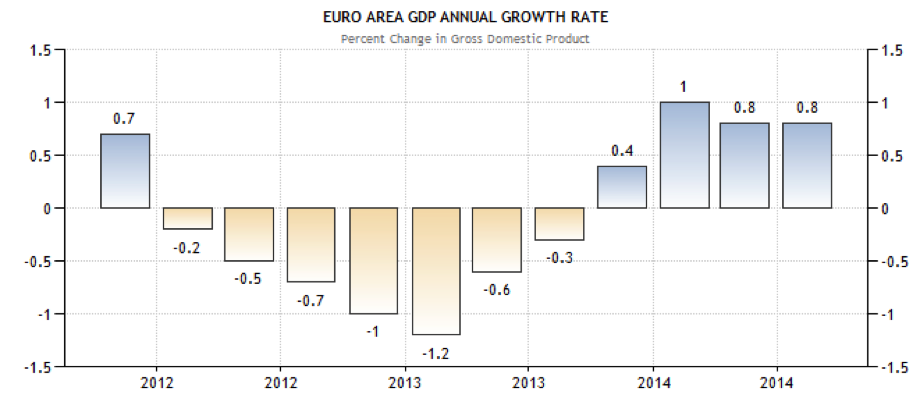 On January 22, ECB president Mario Draghi announced a €1.1tn quantitative easing program in a bid to lift the eurozone’s economy out of an environment of weak growth and deflation. Eurozone prices fell by 0.2% in December and were expected to drop by 0.6% in January, primarily due to recent tumbling crude oil prices. The ECB is set to buy €60bn of bonds every month until at least September 2016, with the intent to increase the eurozone money supply, keep interest rates at a record low of 0.05% and ultimately encourage borrowing and spending.
On January 22, ECB president Mario Draghi announced a €1.1tn quantitative easing program in a bid to lift the eurozone’s economy out of an environment of weak growth and deflation. Eurozone prices fell by 0.2% in December and were expected to drop by 0.6% in January, primarily due to recent tumbling crude oil prices. The ECB is set to buy €60bn of bonds every month until at least September 2016, with the intent to increase the eurozone money supply, keep interest rates at a record low of 0.05% and ultimately encourage borrowing and spending.

Source: Trading Economics | Eurostat
The euro, however, has suffered – it fell to an 11-year low against the dollar soon after the ECB announcement and continued to weaken, hitting a low of $1.1304 before recovering modestly in the last week. Concerns over recent negotiations between the newly elected Greek government and the ECB have added further downward pressure to the euro.
Syriza, the left-wing party that recently took over in Greece with a 36% share of the vote, rode to power principally on a campaign promise to write off the majority of the country’s debt that arose from its bailout, provided by the ECB, the EU and the IMF. The debt currently stands at over €320bn, which is approximately 175% of its GDP. The Syriza government also hopes to convince the ECB to continue providing emergency finance to selected major banks in Greece.
Greece’s new finance minister Yanis Varoufakis met with the ECB on February 4, and with German finance minister Wolfgang Schäuble the day after, to renegotiate the terms of Greece’s debt repayment and, in particular, to ask for more time to repay the debt. However, it appears that Varoufakis was met with very little flexibility from both parties, with the ECB deciding that it would no longer allow Greek government bonds to be used as collateral for any loans. Furthermore, the only common ground found by the two finance ministers appears to be a stated joint ongoing commitment to maintaining unity for the eurozone and its single currency.
In stark contrast to Greece’s woes, Germany has made it a domestic priority to avoid accumulating excessive debt. Its balanced budget for 2015, known as the ‘black zero,’ marks the first time in 45 years that Germany will not adopt any new sovereign debt. Moreover, in 2016 its federal government will implement a new constitutional measure that constrains its level of borrowing.
Priorities have changed since the 2008 financial crisis, which resulted in the German government borrowing funds in order to bail out several banks. Chancellor Angela Merkel made it clear in 2011 that living beyond one’s means was not possible anymore, stating that this was true “…for Germany and for every other European country.”
The outlook for the eurozone’s economy in 2015 appears more optimistic than in recent years. On February 5, the European Commission (EC) released its Winter 2015 European Economic Forecast. Although the report highlights the weak economic growth exhibited by the eurozone since the debt crisis, the tumbling price of crude oil since July 2014 is expected to boost GDP growth in 2015 by increasing consumers’ disposable income and lowering corporate production costs. It will continue to add unwelcome deflationary pressure to the economy, however. The EC is predicting the eurozone will grow by 1.3% in 2015 and 1.9% next year. Given the challenges in predicting Europe’s economic future, investors need to focus on companies with strong fundamentals that can weather a prolonged period of slow growth.

